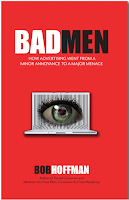It wasn't long ago that naive digital utopians labeled the web the "information superhighway" and promoted it as the great democratizing medium that would give us all a voice.
For a good laugh, here's a quote from Arianna Huffington from 2012...
"Thanks to YouTube -- and blogging and instant fact-checking and viral emails -- it is getting harder and harder to get away with repeating brazen lies without paying a price..."Yeah, right. I'm just curious about what universe Ms. Huffington resides in.
In fact, what was promised to be the "information superhighway" has turned out to be an autobahn of stupidity, pornography, narcissism, fraud, terror, bullying and disinformation. The only saving grace is blogs.
Yes, that's a joke.
For marketers, the digital fantasists promised a world in which online democratization would allow the smallest start-up to challenge the large corporate monsters. Sure, any minute now.
In fact, we are currently living in a business environment in which the consolidation of economic power into the hands of a few massive entities is unprecedented.
Outside of China, Google and Facebook completely dominate the internet. There are literally millions of publishers on the web trying to earn a living. Google and Facebook account for 72% of all the online media revenue.
There has never in history been a duopoly that so dominated a medium. And was so free of governmental restraint. Or self-restraint, for that matter.
They are not just selling media space like the TV, radio, and print people are. They are weaving their way into the fabric of the world's leading companies.
According to Ad Age, Google and Facebook now have teams of people who are embedded in the marketing departments of over half the world's 50 leading brands. They are not just vendors to these companies, they are part of the process of developing marketing and advertising strategies.
They are so far ahead of the traditional media, they might as well be from another century...oh, wait a minute. They are.
I have often written about the pitiful efforts of traditional media to fight against the tidal wave of online media. They pathetically believe that they are going to survive on the crumbs of online media revenue that Google and Facebook spill, and so they are too timid to confront online media directly (the result of which can be found in yesterday's newsletter.)
They have no strategy to defend their businesses -- other than whining. These guys can't find their dicks with a flashlight.
But let's stop picking on traditional media for a minute and have a look at how the cozy relationships between Google, Facebook and their marketing partners might be working.
Apparently P&G and Unilever have been bragging that because of their close relationship with Facebook, they were not surprised that Facebook had been overstating video viewing times by up to 80% for two years. The above-mentioned Ad Age article says... "P&G and Unilever...weren't blindsided by the recent revelation that Facebook overstated average video view times."
Really? So here are some questions I'd like answered:
- If P&G and Unilever knew that Facebook's numbers were bullshit, why didn't they say something?
- Or, why didn't they tell Facebook?
- Or, did they tell Facebook and Facebook did nothing?
- Or, did they conspire with their pals at Facebook to keep it quiet and have a good laugh about it?
WTF kind of bullshit is going on here?






